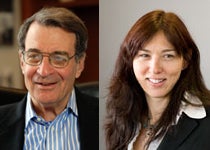Prominent legal and political scholars explored the relationship between terrorism, diplomacy and law in a panel discussion in early October in light of “Laws, Outlaws, and Terrorists” (2010), a book written by Harvard Law School Professor Philip Heymann ’60 and Associate Professor Gabriella Blum LL.M. ’01 S.J.D. ’03. The conversation took place after the authors recently received the 2010 Chicago-Kent College of Law/Roy C. Palmer Civil Liberties Prize (see sidebar).
Along with Heymann and Blum, the panel featured HLS Professors David Barron ’94 and Robert Mnookin ’68; Graham Allison, director of the Belfer Center for Science and International Affairs at Harvard’s Kennedy School of Government; and HLS Visiting Professor Sanford Levinson, who is on the faculty of the University of Texas at Austin School of Law.
Levinson, who is teaching a seminar on Constitutional Norms in Times of Emergencies at HLS this term, highlighted the role of the president in times of emergency, namely the challenge of choosing unlawful but necessary measures to protect national security. Putting all the reliance on presidents is a mistake, said Levinson. “They’re very good at what they do, which is running for office and inspiring us in behalf of some vision or another. But that’s very different from knowing much about any of the specific issues that are confronted.”
Instead, Levinson favors a “council of elders” consisting of policy makers who will select appropriate experts to handle national security emergencies.
Barron drew on his recent experiences in the Office of Legal Counsel in the Department of Justice to explain that, although the public has no real capacity to stop the president from acting extra-legally, it is unnecessary to view him as a dictator in times of emergency.
“We need to do much more about prefiguring the examples of executive restraint which have turned out to happen with surprising frequency,” Barron said, citing the incident of George H.W. Bush asking authorization from Congress for the First Gulf War in 1990 when he could have chosen not to.
Mnookin, director of the Harvard Negotiation Research Project, discussed the challenge of bargaining with terrorists. Deontological factors often play into the negotiation process, he said, whereby trying to make a deal with an adversary with opposing values “often won’t feel good not (just) because of emotional reasons, but intuitively… you may be giving up what you see as the pursuit of justice.”
Allison called attention to the distance between facts and beliefs regarding terrorism and its victims. He said a substantial number of people in countries like Turkey and Indonesia believe that either the United States or Israel was behind 9/11 even though Al Qaeda has released a video claiming responsibility. He added that only an estimated 25 out of the 15,000 killed by terrorism last year were American, challenging the definition of terrorism and how it is perceived in the U.S. and abroad.
“There is no such thing as terrorism… these are concepts and constructs that we invent which we use for classifying phenomena,” said Allison.
Blum suggested that leaders need to be more responsible instead of making “political capital” out of advertising the threat as worse than it is. “Learning to live with some degree of risk and threat in our lives is necessary,” she said.
Heymann concluded the event by discussing the popular demand for lawfulness in the U.S. – a demand that will keep the president accountable. “In an emergency, the president should act and if he has to act against the law, he should break the law, but he should do it openly and he should put his fate in the hands of the American people,” he said. “We believe in a force of powerful lawfulness which is built into 230 years of American history.”
